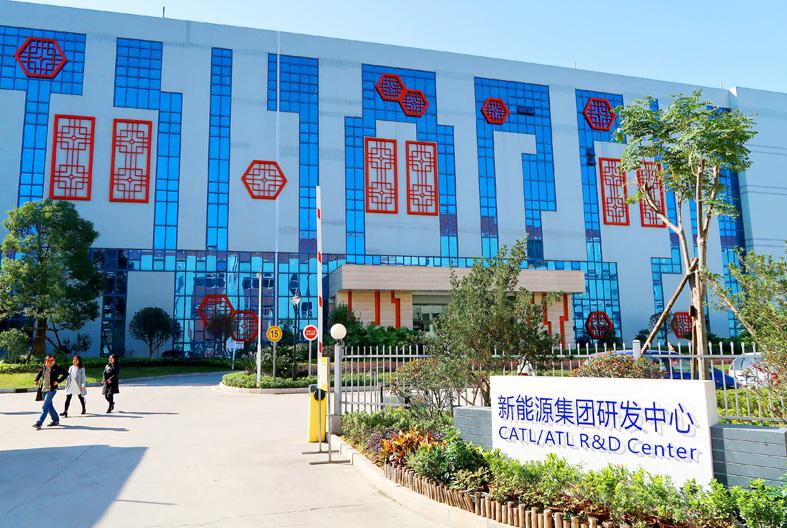China’s Contemporary Amperex Technology Co Ltd (CATL, 新能源科技), the world’s biggest maker of batteries for electric vehicles, is considering at least two locations in Mexico for a manufacturing plant to potentially supply Tesla Inc and Ford Motor Co.
The battery manufacturer is considering Ciudad Juarez, in the state of Chihuahua, and Saltillo, in Coahuila, people familiar with the deliberations said.
Both are near the Texas border. The company is contemplating an investment of as much US$5 billion in the project, the people said.

Photo: Reuters
Ciudad Juarez is attractive in part because it is close to the San Jeronimo-Santa Teresa port of entry into New Mexico. That would provide a route around the border crossings of Texas, which is the home of Tesla’s new factory, but in the past few months has taken measures that complicated shipping and entry into the US.
Texas Governor Greg Abbott in April increased inspections of commercial vehicles, stating a desire to crack down on illegal drug trafficking and immigration. Analysis by one economics research body found that it cost the state’s economy more than US$4 billion in lost output due to shipping delays and bridge blockades.
The Ningde, China-based CATL is also considering splitting its investment across two locations — one in the US and one in Mexico, the people said, adding that a final decision has not been made and the total size of the investment is fluid.
The battery maker and Dearborn, Michigan-based Ford declined to comment. Austin, Texas-based Tesla did not respond to a request for comment.
CATL’s shares rose 3.5 percent yesterday in Shenzhen.
Backed by China’s strategic push into electric vehicles, CATL is riding a boom in demand for EVs as countries work to reduce carbon emissions and consumers embrace cleaner vehicles. The company, which completed an initial public offering in 2018, controls more than 30 percent of the global EV battery market.
CATL has been contemplating a battery plant in the US for years, but rising geopolitical tensions between Washington and Beijing have complicated the effort. It is also under competitive pressure to speed a decision, as rivals like LG Energy Solution Ltd, Samsung SDI Co and Panasonic Holdings Corp sign deals with automakers to build battery plants in the US.
The US-Mexico-Canada Agreement on trade, negotiated under then-US president Donald Trump, further complicated CATL’s plans by introducing higher wage requirements for vehicles to trade duty-free, along with stricter content rules. A CATL site would help Mexico, which has long been a major part of the auto industry’s supply chain, cement its role in the region’s electric vehicle production.
An expanded presence in North America could unsettle US officials who are keen on supporting domestic suppliers. US President Joe Biden is allocating billions to cultivate the US battery supply chain and wean the auto industry off its reliance on China, but those efforts would take years to come to fruition through US start-ups and partnerships with South Korean and Japanese companies.

Taiwan’s foreign exchange reserves hit a record high at the end of last month, surpassing the US$600 billion mark for the first time, the central bank said yesterday. Last month, the country’s foreign exchange reserves rose US$5.51 billion from a month earlier to reach US$602.94 billion due to an increase in returns from the central bank’s portfolio management, the movement of other foreign currencies in the portfolio against the US dollar and the bank’s efforts to smooth the volatility of the New Taiwan dollar. Department of Foreign Exchange Director-General Eugene Tsai (蔡炯民)said a rate cut cycle launched by the US Federal Reserve

Handset camera lens maker Largan Precision Co (大立光) on Sunday reported a 6.71 percent year-on-year decline in revenue for the third quarter, despite revenue last month hitting the highest level in 11 months. Third-quarter revenue was NT$17.68 billion (US$581.2 million), compared with NT$18.95 billion a year earlier, the company said in a statement. The figure was in line with Yuanta Securities Investment Consulting Co’s (元大投顧) forecast of NT$17.9 billion, but missed the market consensus estimate of NT$18.97 billion. The third-quarter revenue was a 51.44 percent increase from NT$11.67 billion in the second quarter, as the quarter is usually the peak

Nvidia Corp’s major server production partner Hon Hai Precision Industry Co (鴻海精密) reported 10.99 percent year-on-year growth in quarterly sales, signaling healthy demand for artificial intelligence (AI) infrastructure. Revenue totaled NT$2.06 trillion (US$67.72 billion) in the last quarter, in line with analysts’ projections, a company statement said. On a quarterly basis, revenue was up 14.47 percent. Hon Hai’s businesses cover four primary product segments: cloud and networking, smart consumer electronics, computing, and components and other products. Last quarter, “cloud and networking products delivered strong growth, components and other products demonstrated significant growth, while smart consumer electronics and computing products slightly declined,” compared with the

The US government on Wednesday sanctioned more than two dozen companies in China, Turkey and the United Arab Emirates, including offshoots of a US chip firm, accusing the businesses of providing illicit support to Iran’s military or proxies. The US Department of Commerce included two subsidiaries of US-based chip distributor Arrow Electronics Inc (艾睿電子) on its so-called entity list published on the federal register for facilitating purchases by Iran’s proxies of US tech. Arrow spokesman John Hourigan said that the subsidiaries have been operating in full compliance with US export control regulations and his company is discussing with the US Bureau of